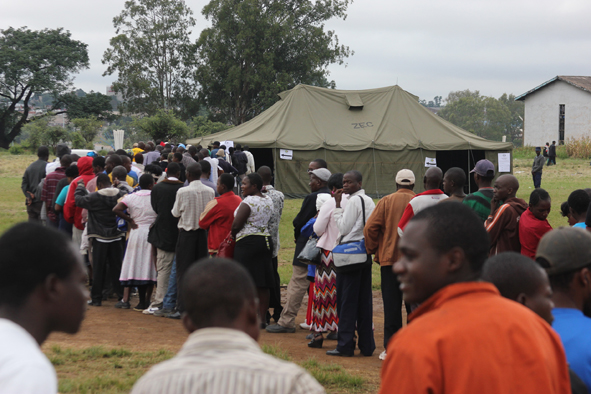
IT’S amazing how times change. For long, election time has seen business organisations and commerce dreading the democratic process.
Report by Bernard Mpofu
For most businesses, Zimbabwe’s politics in the run up to harmonised elections is reminiscent of harassment and persecution of business executives perceived to be opposing the status quo.
Like a hungry carnivore which accuses its young of smelling like prey before devouring it, the government has in the past often interfered with business threatening them with closure on charges of funding the opposition.
That the forthcoming polls are going to be fiercely contested between the two main political parties — Zanu PF and MDC-T is apparent. A growing chorus of discord is echoing in the coalition.
Now, the call for an election, which in the past sent shivers on business, is now a top priority. As the inclusive government, formed in 2009 after a contested Presidential runoff in 2008, sneezes, local business seems to have caught a cold.
Presenting the Treasury State of the Economy Report for April, Finance minister Tendai Biti on Tuesday said Zimbabwe could have lost up to 3% of its gross domestic product during the first four months of the year.
He said the economy is confronted by a myriad of challenges that have seen business adopting a wait-and-see approach resulting in low business activity and low confidence.
- Chamisa under fire over US$120K donation
- Mavhunga puts DeMbare into Chibuku quarterfinals
- Pension funds bet on Cabora Bassa oilfields
- Councils defy govt fire tender directive
Keep Reading
The Finance minister warned that the mining sector, which is the country’s top foreign currency earner, is expected to take a knock due to an anticipated weakening of prices on the international market.
“Total mining royalty collections for the month amounted to $13,5 million, against a target of $20,1 million. The depressed performance was mainly due to softening international mineral prices,” he said.
Biti, who doubles as secretary-general of the MDC-T, said the key to stimulating business activity now lies in the finality of the electoral process. His party, however, argues that an early election which comes before more democratic reforms could be costly. Zanu PF opposes this.
This push for an immediate proclamation of election dates, according to Biti, comes amid growing calls by business for an early poll.
“There is clear evidence of economic decline and the elephant in the living room, self evidently remains the issue of elections,” Biti said.
“I think the sooner there is clarity of the dates, clarity on the processes, clarity on funding, we should see the return of better business confidence. Business are just hanging in there, unsure of what to do given the uncertainty pertaining to the lack of clarity on the exact date of the election.”
But the question that many businesses seem oblivious to is, will the poll bring finality to the country’s fierce political contestation? Already some members of the security service have made public pronouncements backing Mugabe. Analysts argue that such remarks can be interpreted as a coup in slow motion.
This month, the Zimbabwe National Chamber of Commerce vice-president for Mashonaland region Davison Norupiri said political uncertainty in the country had scuttled business plans for most organisations.
“Let’s have elections and it has to be at the shortest possible period so that we will go through that period and then focus on other things,” said Norupiri.
“If people are in an election mode, there is that hold-back and the country becomes dry, in terms of liquidity as you go towards elections. So basically, the election mode is really something that affects quite a number of companies.
“Even companies outside Zimbabwe are now withholding their funds. If they used to give you credit facilities, they are now withholding waiting for that (election) phase to pass.”
The Confederation of Zimbabwe Industries, which in 2011 said an early polls would disrupt most manufacturing firms, now feels that the elections could turn the corner for the manufacturing sector whose capacity utilisation last year plunged to 44% from 57% the prior year.
Unlike most sectors that have raised the red flag, the country’s telecoms sector and tobacco industry remained resilient.
Rapid growth in the telecoms sector, according to the Finance minister, has positioned the industry as the second largest in the region after South Africa. He added that the tobacco sector is on course to meeting the $700 million revenue generated from deliveries of the cash crop this season.
While principals to the inclusive government have pleaded for peace before and after, what political observers say will be watershed polls, it remains to be seen whether the electorate will heed the call.











